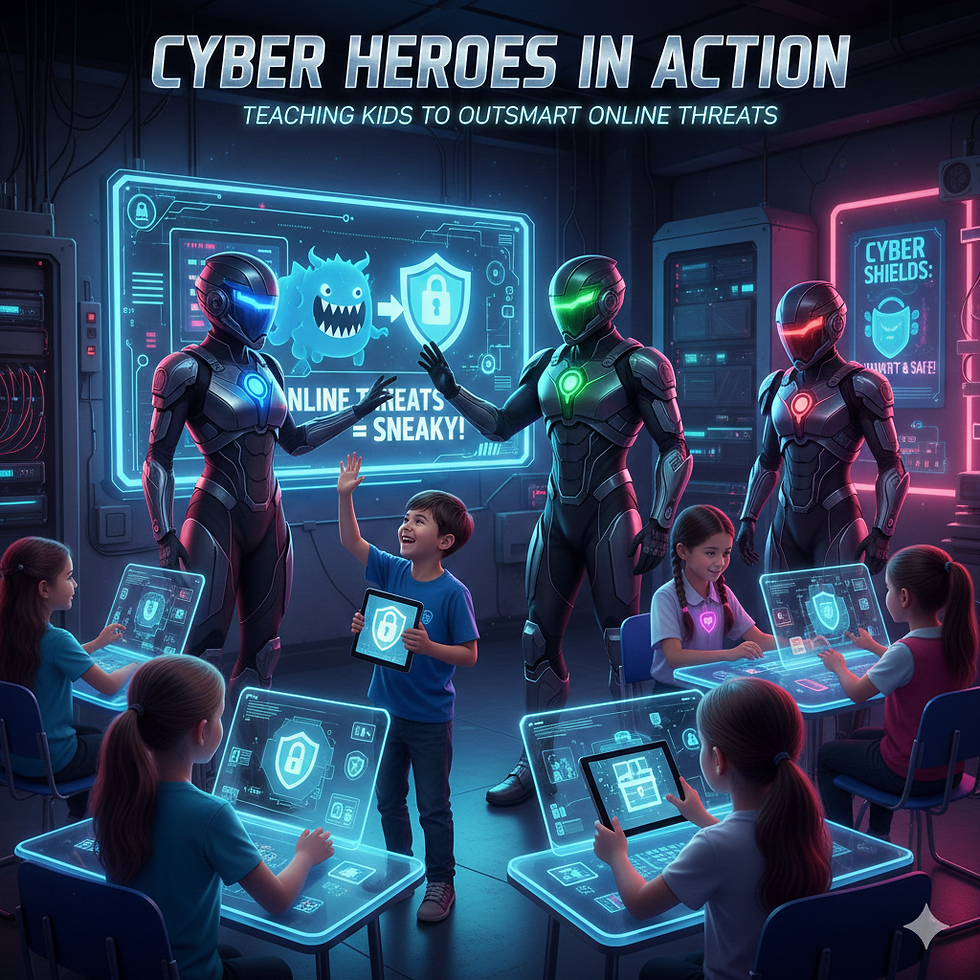Internet Vocabulary Every Parent Should Know (But Might Be Too Embarrassed to Ask)
- Valarian Couch
- Apr 24, 2025
- 4 min read
Navigating the digital landscape can be daunting, especially for parents who may feel overwhelmed by the jargon used online. If you’ve ever found yourself scratching your head at terms like “phishing” or “firewall,” you’re not alone. This guide aims to demystify common internet vocabulary every parent should know, presented in a straightforward and approachable manner.
What is Phishing?
Phishing is a type of cybercrime where scammers try to trick you into giving away personal information, like passwords and credit card numbers. They typically do this by sending emails or messages that look like they’re from legitimate sources, such as your bank or a popular online service. The goal is to get you to click on a link or reply with sensitive information.
In simpler terms, think of phishing as someone trying to steal your personal diary or bank statements by pretending to be someone you trust.
What are Cookies?
Cookies are small files stored on your computer by websites you visit. They’re designed to hold a modest amount of data specific to a particular user and website. Cookies help websites remember your preferences, login details, and shopping cart items.
You can think of cookies like a store receiving your shopping history so they can recommend products tailored to your tastes. However, it’s essential to manage these cookies carefully, lest they gather too much personal information about you.
What is a VPN?
A VPN, or Virtual Private Network, is a service that creates a secure connection between your device and the internet. It masks your IP address and encrypts your data, making it harder for anyone to track your online activities.
Imagine you're sending letters through a postal service that can be read by others. A VPN is like putting those letters in a locked box that only you and the recipient can open. Parents can use VPNs to enhance their family's online privacy and security, especially if children use public Wi-Fi networks.
What is a Firewall?
A firewall is a security system that monitors and controls incoming and outgoing network traffic based on predetermined security rules. Think of it as a gatekeeper for your internet connection. It helps protect your home network and devices from unauthorized access and cyber threats.
If your home were a castle, the firewall would be the sturdy wall and gate that keeps unwanted intruders out while allowing your family to enter and exit freely.
Why Understanding These Terms Matters
For parents, being comfortable with internet vocabulary helps in navigating discussions about online safety, data privacy, and technology usage. The more you know about the tools and risks involved in your child’s digital life, the better you can safeguard their online experiences.
By familiarizing yourself with these key terms, not only will you be able to educate your children, but you’ll also feel more empowered when navigating social media platforms, managing screen time, or discussing online safety.

The Importance of Digital Literacy
Digital literacy goes beyond understanding internet vocabulary. It’s crucial for parents to stay informed about the general landscape of online threats and opportunities. Knowing what to look for—scams, inappropriate content, or digital footprints—will prepare you to guide your children in responsible internet use.
Encouraging digital literacy in your home will also instill confidence in your children as they navigate an ever-evolving digital world. Teaching them about security, privacy, and critical thinking regarding online content can go a long way.
Stay Updated
The world of technology is constantly changing, which means new terms and threats emerge regularly. Make it a habit to read articles or watch videos that explain new developments in the digital space. There’s no shame in seeking knowledge; your children will appreciate your efforts to understand their online environment better.
Resources for Parents
There are numerous resources available to help parents become more tech-savvy. Websites like Common Sense Media offer guides on internet safety, apps, and games, while parenting forums can provide peer support.
You might also consider enrolling in workshops or webinars designed for parents seeking to improve their understanding of technology. Libraries and community centers often host free sessions that can be both informative and engaging.
Conclusion
Understanding the internet vocabulary is not just about feeling comfortable in conversations; it's about empowering parents and protecting families in the digital age. From phishing to firewalls, familiarizing yourself with these terms will enable you to better guide your children through the online world.
So, the next time a digital term pops up that leaves you scratching your head, don’t hesitate to look it up. Knowledge is power, and the well-being of your family in the online landscape is worth the effort. With a bit of curiosity and persistence, you’ll soon be speaking the language of the internet confidently.
By taking these steps, you can foster a safer digital environment for your children and promote responsible internet usage that benefits the entire family. Embrace the opportunity to learn and grow; it’s never too late to become the tech-savvy parent your children need!
.jpg)




Comments